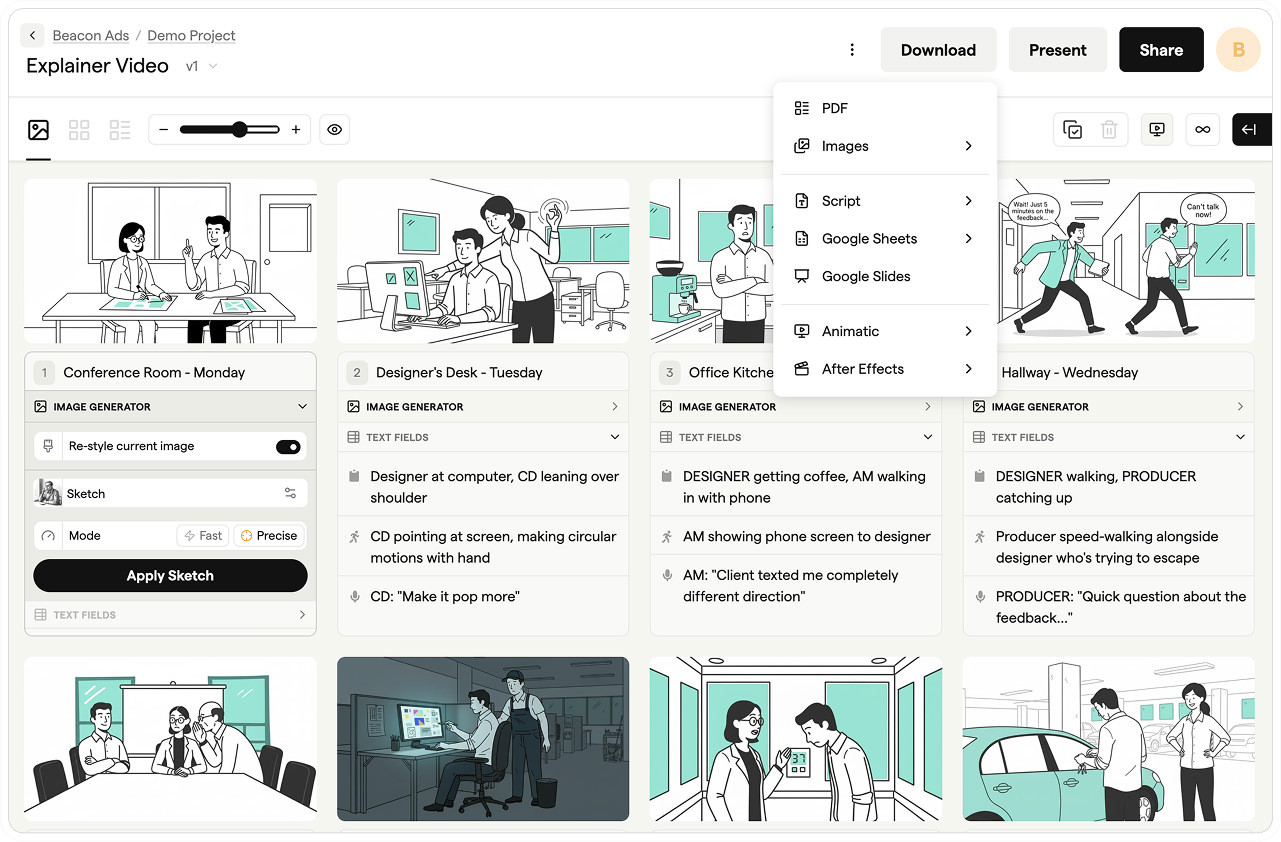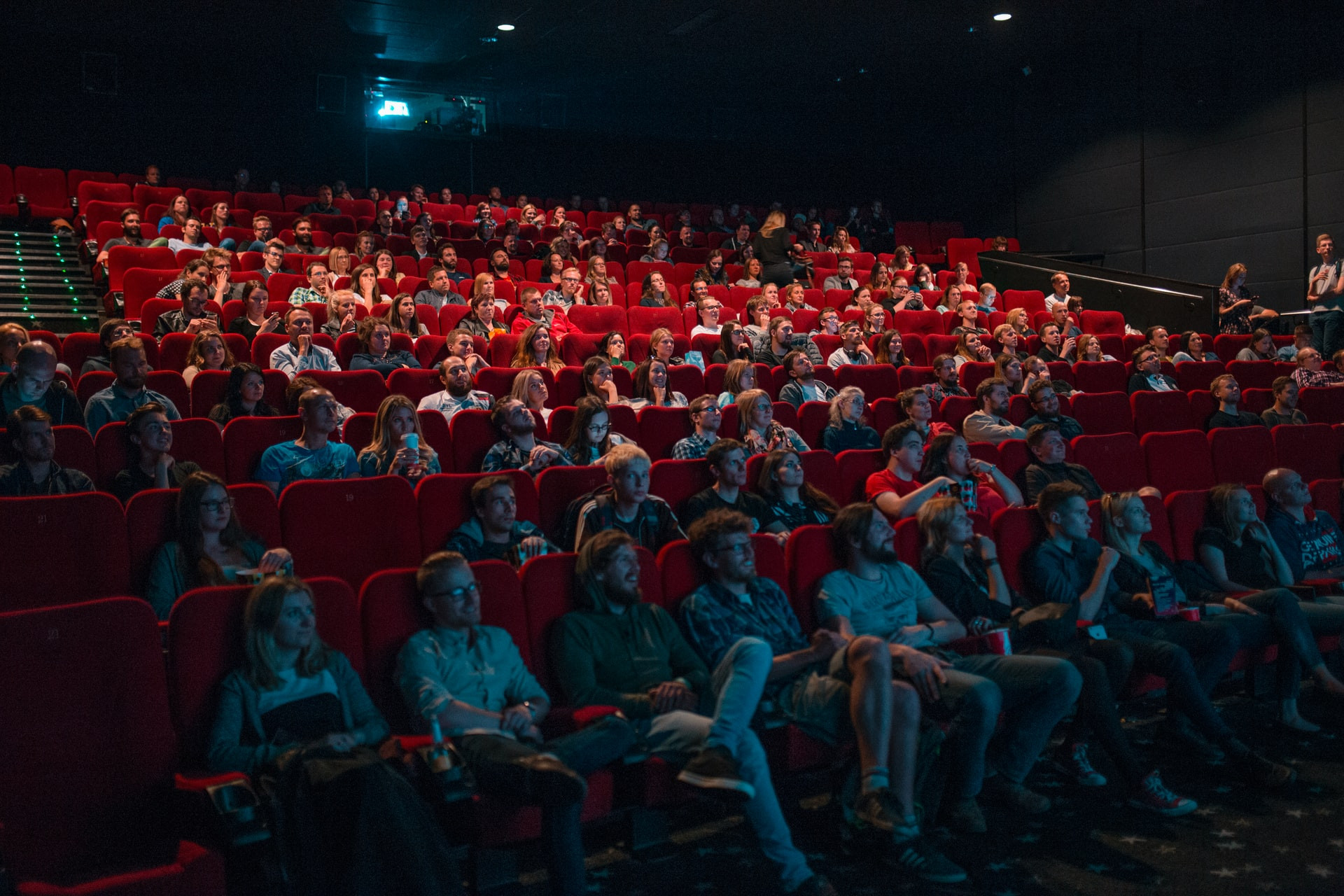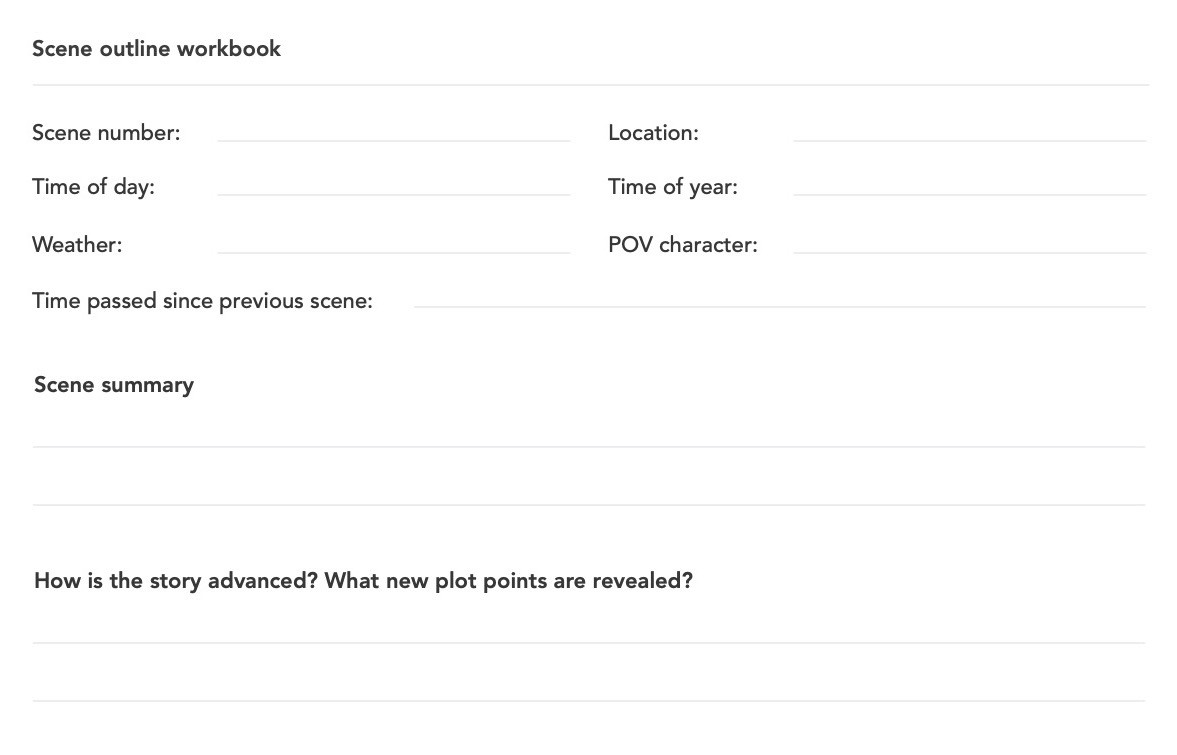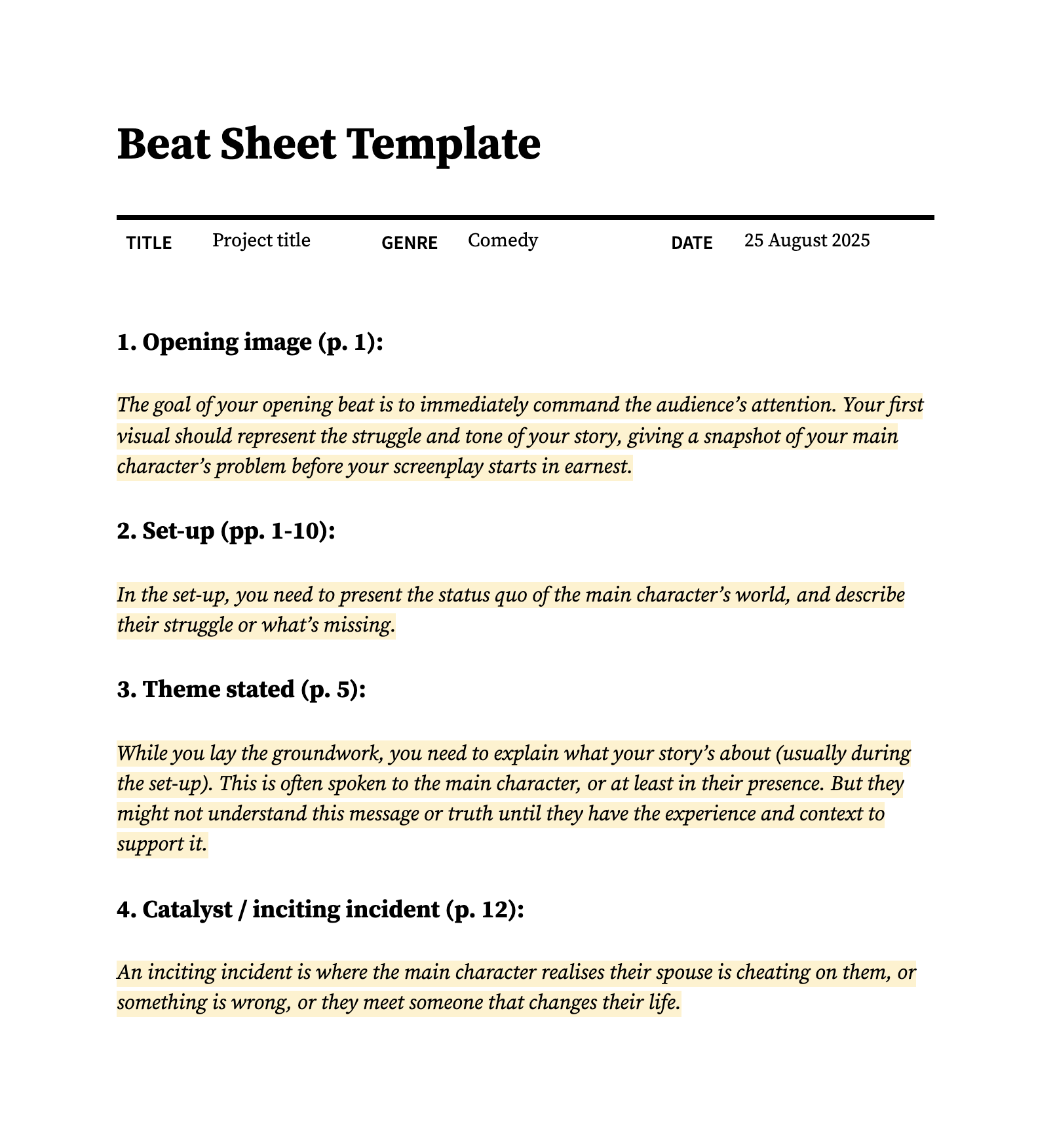What Does a Line Producer Do?

- What is a line producer?
- How do you become a line producer?
- Skills needed to be a line producer
- Job description of a line producer
There are lots of different types of producer in the film industry, all of them playing vital roles when creating a feature film that’ll set Hollywood alight.
You might not have heard the term before, but a line producer is the person who takes care of all the nitty gritty film production details. Their job description includes handling the production budget, hiring the production crew, and a wealth of project management tasks.
Whether you’re looking to become a line producer, or you’re a filmmaker who wants to understand more about a line producer’s job, this piece will tell you everything you need to know.
Boords is storyboarding software built for studios & agencies
Create consistent storyboards fast, iterate quickly, then share for feedback.
Try Boords FreeWhat is a line producer?
A line producer is the person who oversees the production budget and all operations and logistics for a film, from pre-production right through to post-production. A line producer has a lot in common with a production manager, production supervisor, co-producer or unit production manager (UPM) – although there are some subtle differences.
Because line producing is such a fundamental part of the filmmaking process, the executive producer (the person who often assists with financing the production) and film producer (the person managing the production who’s generally involved with big creative decisions) usually hire a line producer early in the pre-production stage.
Once the line producer hires heads of department, those people report directly to the line producer, with the line producer reporting to the film producer.
The line producer occupies a key role in the crew. They’re the glue between the above-the-line talent (actors, writers, directors, etc.) and other crew members (makeup artists, gaffers, location scouts, etc.). While it’s a challenging role, it’s also one that’s important and hugely rewarding.
How do you become a line producer?
The good news is that you don’t need a film school degree or formal qualifications to become a line producer. But you will need to do a lot of work on film sets to get into film producing. And a keen interest in the motion picture world helps, too.
Successful line producers usually work their way into the job by taking on other production jobs. You might go from production assistant to production coordinator to production manager, for example. Once you’ve got some solid experience as a production manager, it’s time to start looking at line producer roles.
Skills needed to be a line producer
Before you quit your day job and decide to become a line producer, there are a few skills you should have under your belt.
- Budgeting
Dealing with facts and figures is a vital part of line producing, so you’ll need to be comfortable with numbers. You’ll also require the negotiation skills and business sense to drive down prices and keep projects on budget. There’s no room for spendthrifts in line producing!
- Leadership
Line producing is a multifaceted role that involves delegating tasks to other people, as well as completing them yourself. To do that, you’ll need to gain and keep the respect of the whole production crew.
- Diplomacy
As the connecting glue between lots of different people involved in the film production, you have to know how to build solid working relationships with everyone around you. If you’ve got a spiky personality, this might not be your gig.
- Networking
Having a big rolodex of industry contacts makes it much easier when hiring heads of department and other crew members. If someone falls ill or drops out, you’ll need to replace them quickly to keep production on track.
Boords is storyboarding software built for studios & agencies
Create consistent storyboards fast, iterate quickly, then share for feedback.
Try Boords FreeJob description of a line producer
During development
Before a film gets made, it goes through the development process. This is a crucial part of the filmmaking journey, where screenwriters wrap up their script and producers start thinking about financing the film.
Line producers usually get involved near the end of this process, helping with a number of key tasks.
- Create a production budget
Before the film goes into pre-production, the line producer assesses the script and creates an initial production budget.
- Break down the script
Line producers go through the script in detail to make a draft shooting schedule. Having a rough idea of the number of days, locations and characters helps with budgeting.
- Assess below-the-line costs
Once they’ve broken down the screenplay, the line producer can estimate other daily production costs like crew members’ salaries, equipment hire and catering.
Once the producers and executive producers have a production budget, they can use it to raise funding for the film. Once the cash rolls in, it’s time to advance to pre-production. Hollywood, here we come!
During pre-production
While a line producer is involved throughout the entire production process, they do the majority of their work in pre-production. Buckle up – there’s a lot to get through.
- Set up the company
Before doing anything else in pre-production, the line producer has to set up a production company. This involves filing paperwork to create an LLC or S-Corp, plus getting a bank account, physical office, phone line, and email addresses for the production crew.
- Break down the script (again)
It’s time for another script breakdown, but this time the line producer joins forces with the first assistant director. Together, they’ll go through the entire script from front to back, creating a thorough, detailed shooting schedule complete with daily production schedules and call sheets.
- Finalise the budget
As the film progresses, the line producer will reopen their spreadsheet for a final spot of budgeting. This time, they’ll lock in figures for every tiny aspect of the film production. Math, baby!
- Hire the team
The line producer is the lucky person who gets to hire a bunch of important production crew roles. All of these roles then report to the line producer.
Production team
Production manager (PM)
Also known as a unit production manager (UPM), this role has a lot of crossover with the line producer. On projects with a smaller budget (like music videos, for example), they’re usually the same person. Whereas the line producer creates the budget and schedule, the production manager executes it.
Production coordinator
The production coordinator mostly works out of the production office, coordinating all the cast, crew and equipment logistics. They also hire production assistants.
Production assistants
Hired by the production coordinator, assistants are there to help anyone on the production team. Their tasks often involve collecting drinks and props, organising paperwork, and doing anything else that needs doing. It’s not always glamorous work, but it sure is essential.
Casting director
The casting director’s job description is to find and cast top talent. The line producer works alongside them to check they’ve hired all the roles they need, and that talent fees fit within the production budget.
First assistant director (AD)
Working with the line producer, the first assistant director helps to break down the script and create the shooting schedule. Teamwork makes the dream work.
Heads of departments
The line producer hires and looks after all department heads, including:
Director of photography (DP)
Production designer
Location manager
Production sound mixer
Other roles
As well as the roles mentioned above, a line producer might also need to help find makeup artists, gaffers, grips, and other people that help to bring a film to life. It all comes down to having a killer list of contacts.
- Find locations
The line producer helps the location manager with location scouting. Their role in this process is to consider practical elements, like whether there’s enough parking at the location, whether the whole crew will fit, and if there’s power and drinking water available – the essential stuff that might otherwise get missed.
- Source equipment
The line producer’s in charge of getting all the necessary equipment for the film, as requested by department heads. At this stage, the line producer’s job is to negotiate with equipment vendors and rental agencies to secure competitive quotes – otherwise, costs can quickly balloon.
During production
As production gets underway, the line producer’s role takes more of a project management slant. They’re primarily trying to keep production running smoothly, on time, and within the budget. Which is no easy task.
- Coordinate with department heads
The line producer meets with all the department heads every day. If there are any problems within the department, the line producer helps to tackle them.
- Make sure payroll is on time
The line producer works with the production accountant to ensure everyone involved with the production gets paid on time. If there are any delays, film unions may move to shut down a production – which throws a huge spanner in the works.
- Think about post-production
Throughout production, the line producer is already planning for post-production by hiring film editors, composers, VFX editors, and finding post-production facilities.
During post-production
Most of a line producer’s work is done when they reach the post-production, and a post-production supervisor will take over many of their responsibilities. That said, there are still a few final things left to do.
- Set up the post-production supervisor
Most importantly, the line producer makes sure that the post-production supervisor has everything they need to do their job. They also give them ‘wrap books’, containing a record of schedules, contracts, vendor agreements, and anything else that’s been agreed since pre-production.
- Wrap the budget
The line producer ties up any budgeting loose ends, and does anything possible to shave off costs – like returning equipment early. A good line producer always has one eye on the bottom line.
- Deliver assets
Working with department heads, the line producer manages the delivery of assets.
These might include a cut of the film for the distributor, or photo assets for the marketing team.
Film production buffs love Boords
If you’re a line producer, you’ll earn brownie points with your screenwriting pals by mentioning Boords. It’s the online storyboarding software trusted by filmmakers, animators, and creatives around the world. Try it for free today at boords.com.
Boords is storyboarding software built for studios & agencies
Create consistent storyboards fast, iterate quickly, then share for feedback.
Try Boords Free






